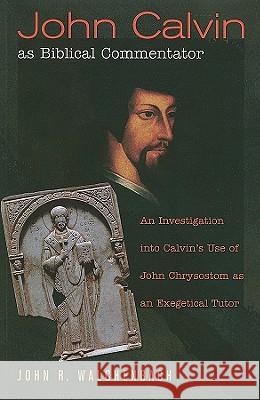John Calvin as Biblical Commentator » książka
John Calvin as Biblical Commentator
ISBN-13: 9781608993284 / Angielski / Miękka / 2010 / 218 str.
John Calvin as Biblical Commentator
ISBN-13: 9781608993284 / Angielski / Miękka / 2010 / 218 str.
(netto: 104,69 VAT: 5%)
Najniższa cena z 30 dni: 108,71
ok. 16-18 dni roboczych.
Darmowa dostawa!
Description:The year 2009 brought with it the 500th anniversary of the birth of John Calvin, a global celebration. With this commemorative event came a new and renewed appreciation for the life and thought of the French Reformer and his profound impact on the world. Scholars universally have acknowledged that while ""The Theologian of Geneva"" is mostly appreciated for his Institutes of the Christian Religion, it is Calvin as a biblical commentator that needs to be taken with revised interest. When Calvin first set out to write a commentary on virtually every book of the Bible, he was drawn to the exegetical work of the great Greek Patriarch of the fourth century, John Chrysostom, because of his ""straightforward, non-allegorical approach to the genuine, simple sense of the text."" It was also the method of Chrysostom to which Calvin was attracted, ""a continuous exposition"" that explains each verse. Calvin, in his life long work to produce commentaries on sacred Scripture, sought to emulate the approach and method of the amazing early church theologian, John Chrysostom. This book celebrates Calvin as Biblical commentator, and what he saw in the literary work of the Greek Father that was so influential on Calvins immense contribution to our understanding the Bible.Endorsements:""The publication of John Calvin as Biblical Commentator will at last bring the wide recognition that John Walchenbachs groundbreaking dissertation has always deserved. In one remarkable work he advanced two areas of Calvin research that were both in their infancy at the time: Calvin as biblical interpreter, and Calvin as a student of the early church teachers. Though both areas of Calvin research have grown considerably in recent years, Walchenbachs work is a benchmark to which we all return.""--Randall C. ZachmanUniversity of Notre Dame ""One of the first dissertations I ever bought was John Walchenbachs study of Calvins use of Chrysostom, which was regarded as a kind of classic for the way it framed the history of exegesis questions in Calvin studies in terms of Calvins use of this influential church father. Appearing in 1974, it was largely ahead of the pack in its field and served as a model for many of us who were cutting our teeth on Calvin and exegesis in the decade that followed. Students today can still benefit from studying Walchenbachs approach, arguments, and conclusions.""--John L. ThompsonFuller Theological Seminary""John Calvin is best known as a reformer and theologian. However, biblical scholars as well as Calvin specialists point out the riches of his biblical expositions found in his sermons and commentaries as well as The Institutes. What is frequently overlooked, however, is Calvins indebtedness to Chrysostom, the greatest expositor of the early church. This outstanding study of Jack Walchenbach makes a distinctive contribution to our understanding of Calvins exegetical approach.""--John HesselinkWestern Theological Seminary, EmeritusAbout the Contributor(s):John R. Walchenbach earned both the ThM and PhD under Ford Lewis Battles at Pittsburgh Theological Seminary and the University of Pittsburgh. He has served as a pastor in both the Reformed Church in America and the Presbyterian Church (USA). He is the author of a new curriculum on John Calvin for Congregational Ministries Publishing of the Presbyterian Church.











